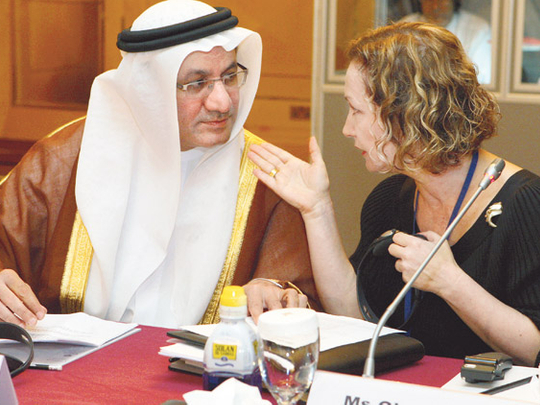
Abu Dhabi: In an efforts to protect and assist victims of trafficking, especially among women and children, and help target criminals who exploit those victims, the UAE has embarked in an international agreement to help combat human trafficking.
While 20 human trafficking cases were recorded in 2008 across the UAE, 43 cases were registered last year alone. Crucially, the number of convictions has also risen significantly.
During the 3rd annual human trafficking workshop held in the UAE’s capital city yesterday, Humaid Al Qatami, UAE Minister of Education, addressed his opening speech on behalf of Dr. Anwar Gargash, UAE Minister of State for Foreign Affairs, to a room full of prominent public figures, from Kazakhstan, Kyrgyzstan, Tajikistan, Thailand, Turkmenistan, Uzbekistan, USA and the UAE.
“The UAE is proud to host this workshop as necessary step to combat one of the most roughly growing organized crimes in the world - the human trafficking crime, which cannot be confronted individually, but depends on corporations between states and international organizations across the world,” said Al Qatami.
As the UAE government’s formal campaign against human trafficking enters its 4th year, the country has especially in the past year, expanded the size and scope of the National Committee to Combat Human Trafficking, by including public prosecutors, law enforcement officers, as well as representatives of the human rights association and victim shelters, as its members.
“While human trafficking cases are not a national phenomenon, most of the reported cases are among women and children in the UAE. Human trafficking has become an increasingly serious crime in all parts of the world, and the UAE is mindful of the challenges that remain,” Dr. Saeed Alghufli, Executive Director for the Federal National Council Affairs, told Gulf News on the sidelines of the forum.
The three day workshop, said Al Qatami during his speech, “will help enhance judicial cooperation, enforcement of law, and skills/qualifications of public prosecutors.”
In cooperation with the UAE’s national committee to combat human trafficking, the education minister explained that victims of trafficking are offered shelter, legal rights, and medical/psychological assistance, till they are safely assisted back to countries of origin – a legislation based on four major principals.
“Human Trafficking is born to go beyond its borders for economic, political and social reasons, that’s why the United Nations Office on Drugs and Crime (UNODC) supports the issue,” said Hatem Aly, a representative for the Gulf Cooperation Council of the UNODC.
“As the UAE education minister alluded, exchange of national and international information between destination countries is paramount to combat human trafficking. There should also be constant cooperation between judiciaries, the police, NGO’s, and the national committee to help curb human trafficking,” added the UNODC representative.
The UAE acknowledges the existence of human trafficking as a problem, since the common scenario among the majority of trafficked persons in the UAE, is that they are promised illusionary job-positions, and end up working under conditions against their consent (i.e. prostitution).
“Human trafficking crimes are common in economically stable countries because business is lucrative. That’s why the UAE is under risk of attracting more human traffickers. Not to mention that the UAE is close to the borders of countries involved in such crimes; victims mostly arrive from South East Asia and Africa,” the UNODC told Gulf News during the sidelines of the forum.
Human Trafficking Cases – 2009
(Source: Prosecution departments of various emirates’ and federal courts, UAE and National Committee to Combat Human Trafficking)
Emirate Cases Victims Accused Conviction 7 22 35 4 21 36 63 16 Sharjah, Ajman, Umm Al Quwain, 13 19 23 13 RAK 2 9 4 2 Total 43 86 125 35
Type of abuse experienced by victims of human trafficking
- Sexual – 91 per cent
- Emotional/verbal – 91 per cent
- Physical – 76 per cent
- Neglect/Deprivation - 55 per cent
UAE government initiatives to help rehabilitate victims
- Dubai foundation for women and children established in 2007
- The women and children centre for victims of human trafficking established in Dubai in 2008, under the UAE red crescent
- The UAE Red Crescent has also established two new shelters in Ras Al Khaimah (RAK) and Fujairah
- Abu Dhabi Ewaa Shelter for Women and Children (now available in RAK and Sharjah)












